World Vision Provides Life Skills to Young Adults in Niger

Biba, a 20 year old sponsor girl from East Harobanda, was very happy to receive a new sewing machine this month. “I got my diploma last year and at the time I remember crying, because all my friends were given a sewing machines and I wasn’t but today is the happiest day of my life. I get one as well,” says Biba, smiling and looking at a sewing machine and kit given to her to start business.
“Before I joined the centre my life was very boring. In the mornings I use to help my mother do the cooking, looking after our goats, do the house chores, look after my siblings and in the afternoons sell oranges and bananas in front of our house. I left school very early because I found it very hard and I didn’t enjoy it very much. But at the centre I learned new things and meet new people,” says Biba, looking at me.
"I left school very early because I found it very hard and I didn’t enjoy it very much. But at the centre I learned new things and meet new people"
World Vision start supporting three centres in East Harobanda in 2012, one of which Biba received her diploma from, the Centre of Education for Youth (CCEJ). World Vision supports the centres with skill training for girls, equipment and prepare the local core team for the follow up the youngest graduates after receiving their diplomas. “Since the establishment of the centre, 753 young girls between the ages of 15 to 24 years old got trained in several skill: sewing, cooking and embroidering. But the in past not all girls that finish their two year training received a free machine. For example, in 1998 and 2000 the centre lent10 sewing machine to 10 young girls on a condition that they had to pay for the machines and sewing kits in instalments when they started earning money from their business. But in 2012, 30 young girls received free sewing machines and sewing kits, thanks to support from World Vision. World Vision helped the integration of a lot of girls into the world of business in East Harobanda. Biba is a living example of that,” says Noufoumaiga Allagouma the head of the centre since 2003.
“At the centre I learnt all types of things. The trainers taught me how to cook different sauces, make baby clothes, ladies garments and prevent sexual transmitted diseases like HIV/AIDS and also unwanted pregnancies in the reproductive health sessions. I know many friends that have been abandoned by their boyfriends after getting pregnant or ill. I don’t want the something to happen to me and now I know how to avoid it,” Biba says, arranging her headscarf.
"...she always shares what she makes with us. With the rest she is able to take care of herself. You cannot imagine how happy and proud I am of my daughter”
With the new skill, Biba is able to help a family says her mother. “My daughter helps the family. Biba’s father use to work as a gardener and what he earned was enough to look after the family before he got paralyzed two years ago. I use to travel to Burkina Faso to buy cheap goods; clothes, pots and pans, which I use to resell in Niamey. But with my husband’s illness, my little business was over and it became very difficult to look after the 6 children (3 boys and 3 girls). Luckily for us, Biba received orders to make ladies garments in the atelier where she works as an apprentice and she always shares what she makes with us. With the rest she is able to take care of herself. You cannot imagine how happy and proud I am of my daughter,” says Salmoue, Biba’s mother, smiling.
“I really thank World Vision and my sponsor for the sewing machine I received today. I’m feel really lucky, happy and privilege because there are lots of girls in the centre that didn’t get the same opportunity. May God bless you,” says Biba, frankly.
In 2014, World Vision Niger established 16 vocational centres where 267 young girls and boys like Biba were trained in the art of sewing, cooking and carpentry.